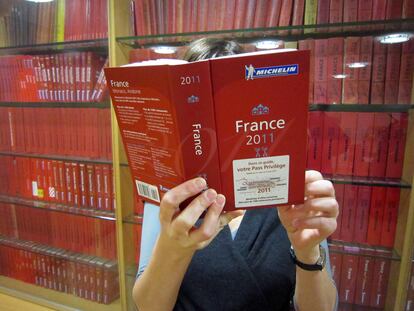Who is the mysterious German Michelin inspector who sets off alarm bells in restaurant kitchens?
Aspirants seeking the French guide’s top distinction know that a visit from Juliane Caspar is one of the most important ones they will ever receive

She is tall, strongly built, very serious, but with a sweet aspect. She barely speaks Spanish, they say. These are some of the features that Spanish chefs highlight about the mysterious German Michelin inspector, who visits every year, especially the restaurants that aspire to receive the guide’s highest distinction. There are no photographs of her with her face uncovered. She often books a table under a false name, a common practice among the French guide’s inspectors, although others make reservations under their own names. That’s why they know it’s Juliane Caspar, 53, who became the first woman in charge of the renowned guide in 2009. That was also the first time that the position of editor-in-chief of the publication went to someone from outside France.
According to Michelin Guides’ director at the time, hotelier Jean-Luc Naret, Caspar’s good management of the German, Austrian and Swiss publications earned her the new position. “When she shows up at the door, you start to tremble,” says one chef, who once had her as a guest. “You know that her report is going to be the determining factor in whether you get the star,” he adds. The highest distinction, a third star, is at stake.
“Yes, it seems that when she visits you, you are up for three stars, and that’s when we start to get nervous,” another chef, who knows what it’s like to experience that moment, says over the phone. If Caspar gives a positive verdict, the restaurant will receive other visits, including one from the Michelin Guide’s editor in Spain and Portugal, José Vallés. “He has to stop by the restaurant as well, especially when it’s the grand prize,” adds the same chef, who prefers to remain anonymous. They also know that if the inspector has tasted the menu, but not Vallés, there is no tri-star rating. They all guess and call each other. They alert each other if they have received any of these visits so that other aspirants are prepared. There is a camaraderie. “If [Caspar] comes to Spain, she goes to several places, and it’s normal for you to find out that she could book a table at your place”.
Juliane Caspar sometimes eats alone. Although it is rare for a woman to come to eat a tasting menu by herself in a restaurant like ours, we have more and more tables reserved for just one person, so we are not usually suspicious. And others come with Vallés. “Even with him, we know he is coming sometimes, but sometimes he shows up unannounced because he has made a reservation under another name,” says the owner of a restaurant that received a visit from the chief inspector without any prior warning of his presence. “When we saw him, we were really surprised. That’s when you have to stay calm.” Another chef we consulted explained that “you are not going to lose your nerve because you have a Michelin inspector; although they’re imposing, you have to try to give them the same service as you’d give any other customer.”

Everyone notes that years ago, before the retirement of the “lifelong” inspectors, it was easier to control the evaluators. Now, following Gwendal Poullennec’s 2018 arrival as international director of the Michelin Guides, that is almost impossible: French evaluators track the northern part of Spain, Germans and Italians visit the Costa del Sol and the Mediterranean, and Portuguese inspectors go to Galicia. “I got one from Portugal, who suggested some changes,” this chef admits. At that moment, he sensed that they were not going to give him anything. That’s because there are inspectors who exchange opinions and offer suggestions to the chefs at the end of the meal. That doesn’t seem to be the case with Caspar; although she makes some conversation during the meal service, and usually asks to see the kitchen to get an idea of the size of the place, she does not pal around, according to the chefs who have dealt with her.
According to Michelin, many envy its inspectors for having one of the best jobs in the world. They all work full-time, and most have been trained in the best hotel and catering schools; they also travel and live in different countries. That is the case with Juliane Caspar, who, according to the scarce documentation about her, was trained at the Hotel Colombi in Freiburg, Germany, and has worked in Italy, the United Kingdom and South Africa.
One of the golden rules on which the French guide insists is anonymity, despite the fact that in an interconnected world that is almost impossible. They say that the inspectors anonymously test the tables to fully appreciate the level of service offered to all customers. They pay the bill, and at this point they can reveal their identity if they want to obtain any additional information. Caspar does just that when she asks to see the kitchen. What she does not know is that often all of her movements have been observed in detail from those very stoves.
Sign up for our weekly newsletter to get more English-language news coverage from EL PAÍS USA Edition
Tu suscripción se está usando en otro dispositivo
¿Quieres añadir otro usuario a tu suscripción?
Si continúas leyendo en este dispositivo, no se podrá leer en el otro.
FlechaTu suscripción se está usando en otro dispositivo y solo puedes acceder a EL PAÍS desde un dispositivo a la vez.
Si quieres compartir tu cuenta, cambia tu suscripción a la modalidad Premium, así podrás añadir otro usuario. Cada uno accederá con su propia cuenta de email, lo que os permitirá personalizar vuestra experiencia en EL PAÍS.
¿Tienes una suscripción de empresa? Accede aquí para contratar más cuentas.
En el caso de no saber quién está usando tu cuenta, te recomendamos cambiar tu contraseña aquí.
Si decides continuar compartiendo tu cuenta, este mensaje se mostrará en tu dispositivo y en el de la otra persona que está usando tu cuenta de forma indefinida, afectando a tu experiencia de lectura. Puedes consultar aquí los términos y condiciones de la suscripción digital.









































